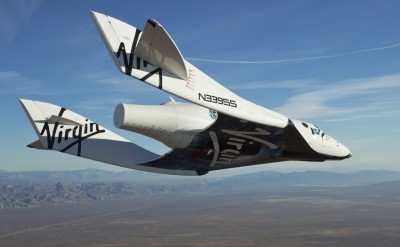Thu, Mar 01, 2012
Will Develop Rack System To Fly Experiments Aboard
SpaceShipTwo
Virgin Galactic, has selected NanoRacks to construct a rack
system to allow research payloads to fly to space aboard Virgin
Galactic’s SpaceShipTwo (SS2). With these new racks, SS2 will
allow researchers to conduct experiments during several minutes of
microgravity using a mounting system also employed on the
International Space Station (ISS).

By providing routine access for research payloads to suborbital
space, Virgin Galactic will expand current research capabilities
beyond existing reduced gravity platforms such as drop towers and
parabolic flights. SS2’s large capacity allows as much as
1,300 pounds (600 kg) of payloads per flight. Additionally, some
flights may also include researchers themselves, able to interact
with their experiments in real time.
“Virgin Galactic’s mission is to revolutionize
access to space and NanoRacks’ experience placing research
payloads on other spacecraft will help us ensure that our vehicle
has a simple and effective platform for researchers. The safety,
flexibility, capacity and modularity of our new racks will make it
easier for researchers to conduct cutting-edge experiments aboard
our space vehicles,” said George Whitesides, CEO and
President of Virgin Galactic. “Reusable suborbital space
vehicles will offer a new platform for scientific researchers and
technologists. Making this announcement at the Next-Generation
Suborbital Researchers Conference is ideal, as this conference is a
powerful demonstration of the research community’s interest
in vehicles like SpaceShipTwo.”
The racks flown on SS2 will allow mounting of any combination of
non-standard and standard payloads. Standard payloads are based on
configurations already in use on platforms like ISS, including
middeck lockers and cargo transfer bags, as well as other common
standards such as server racks. Standard racks will support up to
108 cubic feet of usable payload volume. Additionally, experiments
can be positioned within the rack system for a view through Virgin
Galactic’s large, 17-inch-diameter-windows should acquisition
of spectral data or imaging be desired.
“We are delighted to join Virgin Galactic in providing
world-class research capabilities in the suborbital
environment,” said Jeffrey Manber, Managing Director of
NanoRacks. “For the first time, we will have a seamless
standard from suborbital research to utilization within the U.S.
National Lab on the International Space Station. For researchers to
have repeatable access to bouts of microgravity is an essential
first step to extending their research program.”
More News
Terminal Radar Service Area Airspace surrounding designated airports wherein ATC provides radar vectoring, sequencing, and separation on a full-time basis for all IFR and participa>[...]
Aero Linx: Utah Back Country Pilots Association (UBCP) Through the sharing experiences, the UBCP has built upon a foundation of safe operating practices in some of the most challen>[...]
From 2010 (YouTube Edition): Imagine... Be The Change... Inspire FROM 2010: One of the more unusual phone calls I have ever received occurred a few years ago... from Anousheh Ansar>[...]
(Pilot) Felt A Shudder And Heard The Engine Sounding Differently, Followed By The Engine Chip Detector Light On April 14, 2025, about 1800 Pacific daylight time, a Bell 206B, N1667>[...]
Also: AMA Names Tyler Dobbs, More Falcon 9 Ops, Firefly Launch Unsuccessful, Autonomous F-16s The Air Force has begun ground testing a future uncrewed jet design in a milestone tow>[...]
 ANN's Daily Aero-Term (05.07.25): Terminal Radar Service Area
ANN's Daily Aero-Term (05.07.25): Terminal Radar Service Area ANN's Daily Aero-Linx (05.07.25)
ANN's Daily Aero-Linx (05.07.25) Classic Aero-TV: Anousheh Ansari -- The Woman Behind The Prize
Classic Aero-TV: Anousheh Ansari -- The Woman Behind The Prize NTSB Prelim: Bell 206B
NTSB Prelim: Bell 206B Airborne-NextGen 05.06.25: AF Uncrewed Fighters, Drones v Planes, Joby Crew Test
Airborne-NextGen 05.06.25: AF Uncrewed Fighters, Drones v Planes, Joby Crew Test



